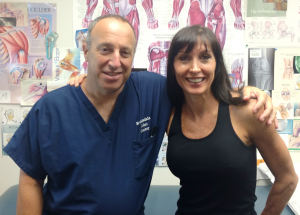Your physician is an expert on medical care. You are the expert on yourself. Be prepared for your office visit.
Many people achieve more satisfaction with their health care if they can share the responsibility with their health professionals. While your physician is an expert on medical care, you are the expert on yourself. Be prepared on your office visit to tell the doctor your thoughts, opinions, and feelings about what treatment you have interest in. Give us a good history of prior treatments you have tried. Our practice has a higher percentage of patients seeking surgery, because we are subspecialists in that area. Understand that there may be many options for care of a particular diagnosis. Not every patient is a good candidate for surgery. Sometimes it is necessary to spend time improving your physical or mental condition before considering the stress of surgery. For instance, weight loss ( if you are above normal ) is an incredibly important aspect of care, and greatly improve results and satisfaction.

Often there can be more than one option for diagnosing or treating a condition. By acting as a partner with your doctor, you can help choose the option that best fits your values, beliefs, and lifestyle. This can make you feel more confident about carrying out the treatment you have chosen. Keeping in mind, being prepared for your visit will help you get the most out of your appointment:
What to bring
If at all possible, please complete the new patient forms and bring them to your office visit for the doctor prior to your arrival at the office. If you have been evaluated, by another physician, previously for this or any related condition, please bring all relevant materials from that office visit. We really appreciate the extra work you do to collect records and “hard copy” Xray films if possible. Dr. Kozinn likes to show you the larger hard copy films, and to draw diagrams of possible care on them. In a new world of “digital and electronic data”, it is sometimes harder to get “old” xrays on plastic film, but we really like them if you can get them! Dr. Kozinn hangs your films in the operating room like a piece of artwork, to refer to more easily during surgery. Help us understand what medications you are on, and particularly what medications you may be allergic to!
- Medical records , X-Rays, CT scans, MRIs, Nerve studies.
- A list of medications that you currently take and any medical problems you have.
What to think about
Also, you can help your doctor diagnose and treat your condition by being prepared to answer the following questions:
- What are your main symptoms?
- How long have you had your symptoms?
- What were you doing when your symptoms started?
- Have you had this problem in the past?
- What was the diagnosis?
- How was it treated?
- How and when did an injury occur? How was it treated?
- Have you had any injuries in the past to the same area? Do you have any continuing problems because of the previous injury?
- Have you ever had surgery in that area?
- What activities, related to sports, work, or your lifestyle, make your symptoms better or worse?
- Do you think that activities related to your job or hobbies caused your symptoms?
- What home treatment measures have you tried? Did they help?
- What nonprescription medicines have you taken? Did they help?
Many patients expect immediate solutions to their problems. This is not always realistic. Be patient! Good medical care starts with your office visit, but may take many months to find the best, safest and longest lasting solution.